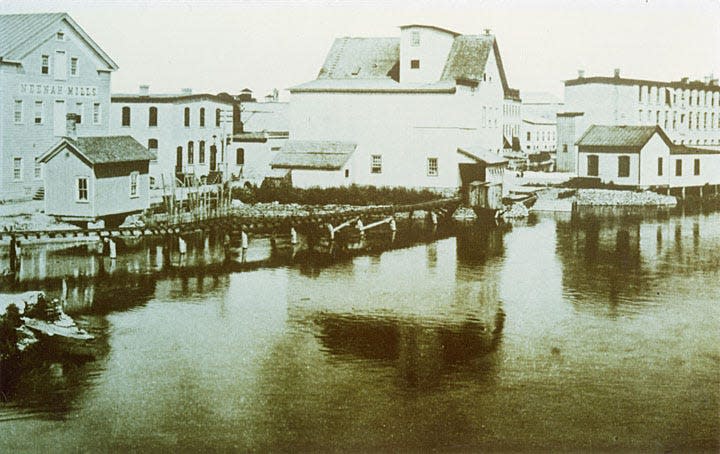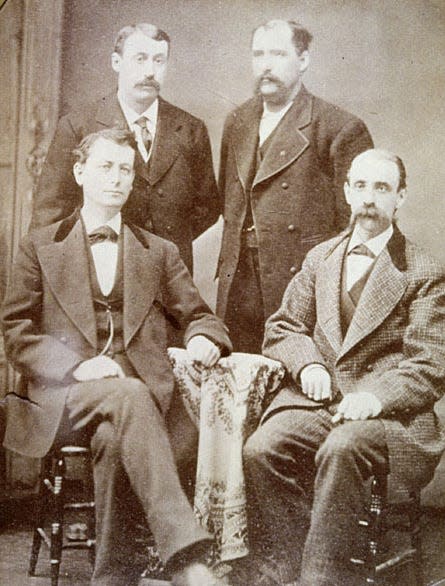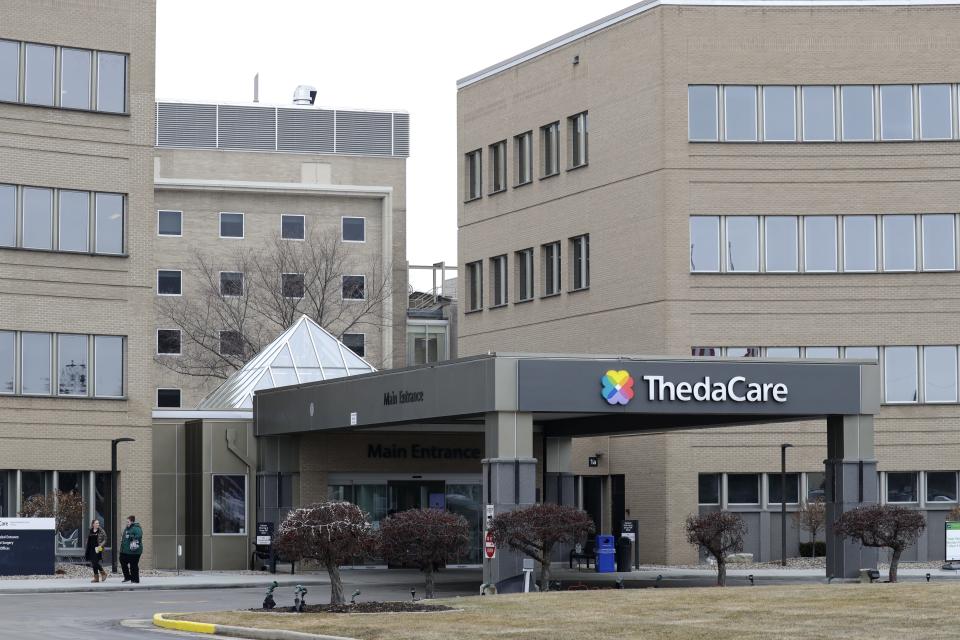It started with flour mills: Here are the businesses that shaped Neenah over 150 years
- Oops!Something went wrong.Please try again later.
- Oops!Something went wrong.Please try again later.
NEENAH – You can't look at the history of Neenah and not focus on the industries and the families that built them over the city's 150 years, said Erica Suchyta, assistant executive director of the Neenah Historical Society.
First, the flour mills popped up. Then, the paper companies spread across the region. More recently, Neenah's economy relies on health care, teleservices and the design and manufacturing of electronic components.
Over the years, these industries have shaped the community, providing a place for people to earn their livelihoods and work among their friends and fellow residents, Suchyta said. For example, companies Kimberly-Clark and Neenah Foundry have spread the Neenah name far and wide, through their production of paper-based consumer products and manhole covers.
As Neenah celebrates its sesquicentennial anniversary Monday, not all of the businesses from the city's past are around to see it. But "they still play this really important role in who we are culturally," Suchyta said.
"They'll be with us forever."
More: Neenah's rich history spans everything from Kleenex to Plexus
More:Neenah marks 150 years as a city with treasure hunt, birthday cake, music and more
Flour mills came first, because of the river
The first major industry in Neenah centered around its flour, or grist, mills. These began in the 19th Century, before Neenah even incorporated as a village and then as a city, in 1856 and 1873, respectively.
"Flour took off because the river here didn't freeze," Suchyta said. "So, you would have people from Green Bay and Oshkosh come up ..., and they could have things ground year round."
In 1870, there were eight flour mills in Neenah, and nearly twice that many when factoring in Menasha, according to the historical society.
Members of the Kimberly and Babcock families established the Neenah Flour Mill and Reliance Flour Mill. There were also the Winnebago and Island City mills.
Paper would replace flour in the following decades, though, and the last flour mill closed in 1908.

Neenah paper companies make tissue, book paper, other products
Paper mills started to take off in Neenah as industrialists from the East Coast moved in, looking to buy a tract of land, build a factory and make money, Suchyta said.
"We offered the perfect setting," for people to harness water power, she said, so the paper mills took off "pretty quickly" in the late 1800s, into the turn of the century.
The Neenah Paper Mill was the first paper mill built on Neenah’s water power in 1866, according to the historical society. A local newspaper at the time applauded the development, saying "every improvement on the water power at the foot of Lake Winnebago adds to the wealth and population of the county."
The biggest paper company to come out of Neenah is Kimberly-Clark, which celebrated its own 150th anniversary last year.
Kimberly-Clark is now a multibillion-dollar international company. But it was started in 1872 by four men — John A. Kimberly, Charles B. Clark, Havilah Babcock and Frank C. Shattuck — as Kimberly, Clark and Co., with the Globe Mill.

The company originally made all-rag newsprint. As it grew and evolved over the decades, Kimberly-Clark introduced the world to Kotex, Kleenex, Huggies, Cottonelle, Depend and Pull-Ups, among other products.
In the 1980s, Kimberly-Clark moved its global headquarters out of Neenah to Texas. Today, the company still has four manufacturing facilities in Wisconsin, including in Neenah.
"As someone who was born, raised and currently resides in Neenah, I can confidently say Kimberly-Clark is the caring company it is today because of its roots in Neenah," said Ryan Weiland, who is the company's North American vice president of research and engineering and the Neenah site leader.
The city and its surrounding communities have enabled Kimberly-Clark to grow and develop products over the years, Weiland said, and "we look forward to continuing to thrive and invest in Neenah over the next 150 years."
More:Kimberly-Clark offers rare glimpse inside Neenah X-Mill, where new products are created
Neenah Paper, a division of Neenah Inc., also got its start in Neenah, in 1873. Last year, Neenah Inc., which is now based in Georgia, merged with Schweitzer-Mauduit International Inc., to form Mativ Holdings Inc. The company continues to operate mills in Stevens Point and Neenah, which produce high-end packaging, premium labels and fine papers.
There was also Bergstrom Paper, which was established in 1904 in Neenah by a father and son who purchased Winnebago Paper Mill. Bergstrom Paper was later sold to P.H. Glatfelter Co., and the mill, which made book papers, was eventually closed in 2006.
More:After these 12 Wisconsin paper mills shut down, several aimed for redevelopment. What are they now?
Paper companies give way to new industries in Neenah
In their prime, the paper mills were "really the foundation of the community," Suchyta said.
"Even post-World War II era, you would graduate high school, you would get a job in the mill, you could live a very comfortable life," she said.
But as ownership changed, jobs moved and mills closed or switched what was made, "that affected our economy and our infrastructure," Suchyta said.
When that happened, people worked very hard to make Neenah an attractive place to come, Suchyta said, and different industries now fuel the city.
Today, Neenah is home to Alta Resources, a telemarketing and customer care company; Menasha Corporation, an international manufacturer of corrugated and plastic packaging; Bergstrom Automotive retailers; Neenah Enterprises Inc., which includes Neenah Foundry; and Plexus Corp., which built its global headquarters on the site of the former Glatfelter paper mill.
Neenah's "thriving community" plays a key role in Plexus's ability to attract and retain talented people, said Todd Kelsey, the company's CEO. This allows the company to continue to grow, since its founding in Neenah more than 40 years ago, and to support the city, he said.

ThedaCare Regional Medical Center-Neenah is another current pillar of the community with a long history. As Dr. Imran Andrabi, president and CEO of ThedaCare, often says, "A baby was born and everything changed."
With no nearby hospital available at the time, Theda Clark Peters — the daughter of one of the founders of Kimberly-Clark — died from complications of childbirth in 1903. Her family used money set aside in her will to open Theda Clark Memorial Hospital in 1909. It had 20 beds, one operating room, an emergency room and delivery room.
Flash forward to today, that hospital is an anchor of ThedaCare's broader health care system, serving more than 600,000 residents in northeast and central Wisconsin.
“It would not have been possible had the roots not taken place in the Neenah community," Andrabi said.
ThedaCare Regional Medical Center-Neenah is currently undergoing a $100 million investment to modernize the hospital. The goal, Andrabi, said, is to set up the facility to serve the community for decades to come.
Reach Becky Jacobs at bjacobs@gannett.com or 920-993-7117. Follow her on Twitter at @ruthyjacobs.
This article originally appeared on Appleton Post-Crescent: Neenah's industries play important role in city's 150th anniversary

